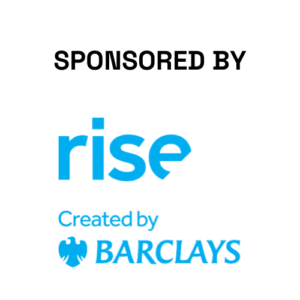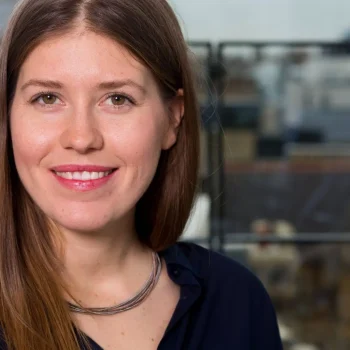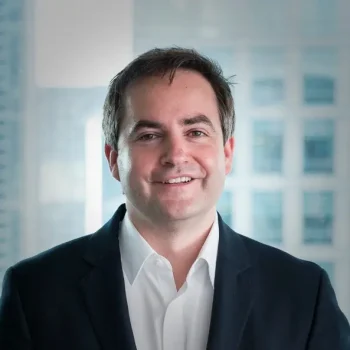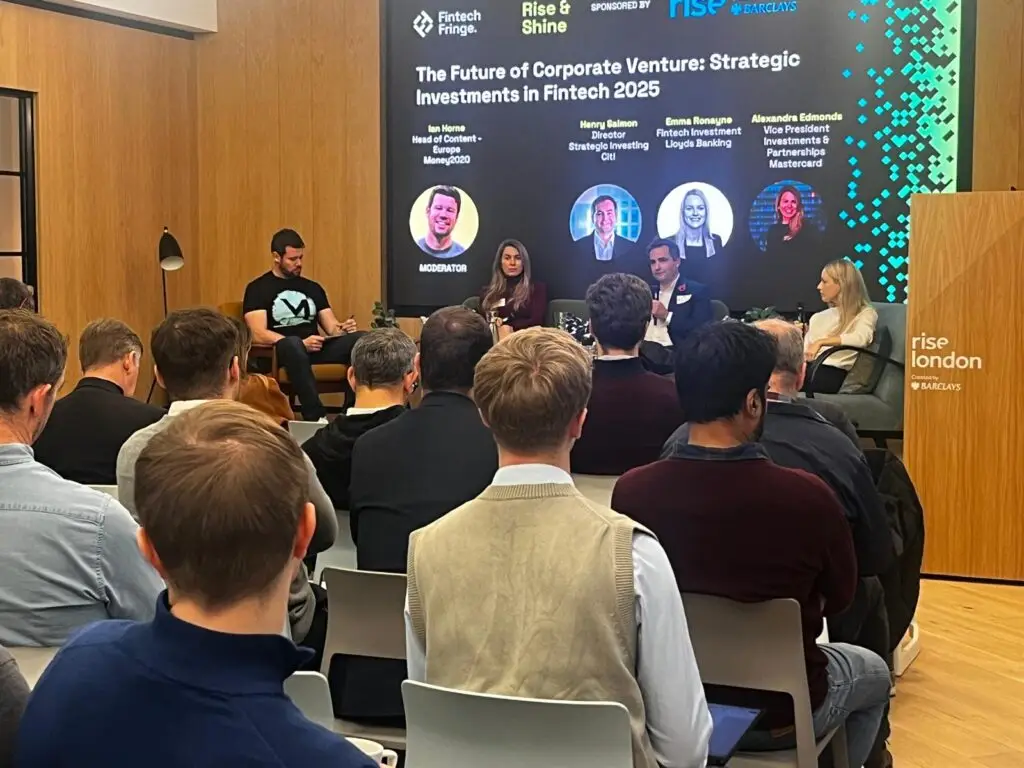
The latest Rise & Shine session, hosted by Fintech Fringe, brought together fintech founders, VCs, and corporate investors at Rise London to discuss the future of fundraising as we approach 2025.
Industry experts shared personal insights into the shifting investment landscape, strategies for growth, and the importance of building lasting partnerships. Key themes included resilience, aligning with strategic trends, and adapting to an evolving economic environment. Attendees left inspired and equipped with actionable advice to thrive in the competitive fintech landscape.
SPEAKERS
- Moderator: Ian Horne, Head of Content, Money2020
- Moderator: Magdalena Krön, Vice-chair UCL International Advisory Board and startup advisor
- Calypso Harland, Founder, Fintech Fringe
- Ben Marrel, Co-founder & CEO, Breega
- Greta Anderson, Principal, Balderton Capital
- Kevin Chong, Co-founder & General Partner, Outward VC
- Alexandra Edmonds, VP of Emerging Fin Tech, Mastercard
- Emma Ronayne, Fintech Investment, Lloyds Banking Group
- Henry Salmon, Director – Strategic Investing, Citi
Keynote: The 2025 Fundraising Horizon—Trends, Challenges, and Opportunities
Opening the event, Calypso Harland, Founder of Fintech Fringe, delivered a forward-looking keynote infused with her characteristic optimism tempered by realism. She provided a compelling view on how macroeconomic trends will shape fintech fundraising in 2025.
Key Talking Points:
- Realism & Optimism: Calypso highlighted a cautiously optimistic mood among fintech founders, acknowledging their confidence in growth but recognising persistent challenges in the UK’s regulatory landscape.
- Emerging Sectors: She pointed to AI, payments, and sustainable tech as sectors primed for growth, adding that embedded finance will allow fintechs to “meet customers where they are.”
- Growth Barriers: Calypso didn’t shy away from hard truths, identifying regulatory complexity and funding access as significant hurdles for post-Series A fintechs.
Speaker Tip:
- Calypso Harland: “Founders need to stay adaptable and anticipate macroeconomic shifts to remain competitive. Staying nimble is key to navigating the highs and lows of the investment landscape.”
Panel Session 2: Fundraising Tactics—VC Perspectives and Investor Expectations
A dynamic discussion between VCs moderated by Magdalena Krön brought to life the critical traits that venture capitalists look for in fintech founders. Panelists shared their unique, candid insights into investment decisions and strategies for founders seeking to differentiate themselves.
Key Talking Points:
- The Human Factor: The panel explored founder-market fit, resilience, and a strong team dynamic as make-or-break qualities in the early stages.
- Scalability & Execution: Kevin Chong highlighted the value of clear, data-backed scalability and a leadership team capable of agile execution.
- Genuine Innovation Over Buzzwords: Ben Marrel advised founders to “avoid building for the hype.” He urged them to stay true to solving genuine problems rather than catering to perceived investor interests.
Speaker Tips:
- Ben Marrel, Breega: “Don’t build a company for investors; build it to solve a big problem. Investors will come to you if the solution is compelling enough.”
- Greta Anderson, Balderton: “Having a deep understanding of the problem you’re solving is invaluable. We look for founders who know their market and buyer needs intimately.”
- Kevin Chong, Outward VC: “Preparation and determination are key; founders should bring real substance to the table, not just buzzwords. Investors are looking for grit tempered with humility.”
Panel Session 3: The Future of Corporate Venture—Strategic Investments in Fintech
In the closing session, a discussion on the future of corporate venture capital (CVC) saw CVC leaders share their visions and personal motivations behind strategic fintech investments. With perspectives ranging from Citi, Lloyds Banking, and Mastercard, this session illustrated how CVCs are not only investing for financial returns but also aiming to meet strategic innovation goals.
Key Talking Points:
- Alignment & Value Addition: Emma Ronayne, a thought leader in sustainability and finance, highlighted how corporate investors seek fintechs that align with their strategic missions while delivering tangible benefits.
- Proofing with Emerging Technologies: Alexandra Edmonds emphasised Mastercard’s commitment to privacy-enhancing technologies, sustainable solutions, and data-driven partnerships, adding that strategic partnerships offer fintechs far more than capital.
- Beyond Capital: Henry Salmon brought his focus on operational efficiency and cross-industry growth, advising fintechs to look for corporate partners who can provide unique market access and strategic expertise, creating a mutually beneficial relationship.
Speaker Tips
- Emma Ronanyne: “Sustainability drives our strategic goals, and we’re looking for fintechs that align with these values across sectors. A successful CVC relationship is built on shared objectives and lasting impact.”
- Henry Salmon: “Collaboration with fintechs needs to result in tangible, horizon-based benefits for our business goals. The ideal partnership creates value that goes beyond the initial investment.”
- Alexandra Edmonds: “Corporate venture can complement institutional investors by identifying niche, strategic partnerships that add value across our roadmap. Working with fintechs is about co-creating value in ways that enrich both sides.”
What’s Next for 2025? Key Areas of Investor Interest
Looking to the future, the panel discussions revealed emerging priorities and trends that investors are focusing on for 2025, offering a clear roadmap for fintechs aiming to capture investment in the coming year:
- Embedded Finance: Investors remain focused on embedded finance as a growth sector, with increasing interest in applications that integrate fintech services into broader platforms. As Alexandra Edmonds noted, “Fintechs that can seamlessly integrate into existing ecosystems and enhance customer journeys will have the edge in 2025.”
- AI and Privacy-Enhancing Technologies: Fintechs that leverage AI responsibly, particularly in compliance-heavy sectors, are attracting attention. Mastercard’s Edmonds highlighted the importance of privacy and data security in AI solutions, signalling that investors will prioritise fintechs that innovate without compromising regulatory compliance.
- Sustainability and ESG: With an emphasis on sustainable tech, CVCs like Lloyds are actively seeking solutions that advance environmental and social goals. Emma Ronayne underscored that “fintechs focused on sustainability will align well with both corporate and VC investment agendas.”
- Operational Efficiency and RegTech: With compliance still a top concern, investors are particularly interested in regtech solutions that streamline regulatory processes and reduce operational complexity. Henry Salmon remarked that “efficiency-driven solutions that support compliance while cutting costs are critical for fintechs seeking growth in a constrained funding environment.”
Top Takeaways
- Resilience Amid Tightened Funding: As the funding landscape tightens, fintechs that show resilience, innovative adaptability, and fiscal discipline will have the edge. Investors are drawn to companies with strategic flexibility.
- Prioritising Compliance: Regulatory compliance is essential, particularly for embedded finance and fintechs operating across borders. With global investments, maintaining regulatory alignment is key to building trust.
- Corporate Partnerships: Engaging with CVCs can be transformative, providing fintechs with access to strategic insights, operational resources, and market entry opportunities that extend beyond financial backing.
To stand out in the 2025 investment landscape, fintechs should prioritise resilience, innovation, and adaptability while fostering sustainable growth through compliance and strategic partnerships.
Our Experts Tips

Calypso Harland, Founder, Fintech Fringe
Founder of Fintech Fringe and content curator for the Rise & Shine events programme.
“Navigate Market Shifts with Agility: As we look to 2025, staying adaptable is key. Founders should anticipate and respond to economic shifts with agility, positioning their businesses to capture new opportunities as the landscape evolves.”
“Prioritise Partnerships for Sustainable Growth: “Meaningful partnerships go beyond financial backing. Seek collaborations where fintechs and corporates align on solving practical challenges, creating pathways for lasting impact.”
“Focus on Real Value, Not Buzzwords: With sectors like embedded finance and AI in the spotlight, it’s easy to get swept up in trends. Founders should focus on genuine growth and solutions that align with their strengths, not just what’s trending.”

Ian Horne, Head of Content, Money2020
I’m the EU Head of Content at Money20/20, Europe’s biggest event for payments, banking and fintech. Besides staging content for the show I’m a writer and published author.
“Focus on outcomes: Communicate often: A founder’s relationship with a (C)VC should be a win-win. Don’t be afraid to ask for help or resources, especially when your investor is strategically positioned to assist. Their reputation is on the line too – they want you to succeed. Don’t wait for the boardroom meeting.
Build a business that solves real problems. Don’t build just to impress a VC. The value-add and business proposition is more important than using the right buzzword or adding .ai to your URL.
You need the right people: Is the founder the right fit for the market? Is your best mate really the right CTO/CMO etc? If you’re competing against big tech, Tier 1 banks, global payment networks and so on, you’re basically playing against the All-Blacks or Real Madrid every week. Have you got the right players on the field?

Ben Marrel, Co-founder & CEO, Breega
Founder turned investor – we built Breega to provide founders with the help we wish we had. Backing tech startups from PreSeed to Series B across Europe & Africa. We started investing in 2015 and now have €650M under management.
“Ticket size = need + maturity: Too often, people overestimate the maturity of their business. If a startup fails to secure the amount they initially requested, they might try to raise a smaller round. But once a fund says no, it’s unlikely they will reconsider, even for a lower amount.
“Intuitu personae: Scaling a business is largely about people. Getting to know someone before sending a deck shows situational intelligence. Investors are more likely to open negotiations if they know the founding team.
“Avoid Overselling: Overpromising can backfire, especially during due diligence. Any discrepancies between promises and actual results may lead investors to withdraw, wasting valuable time and effort.”

Magdalena Krön, Vice-chair UCL International Advisory Board and startup advisor
Investing, connecting and advising startups who are focusing on shaping the future of technology and financial services.
“Know thy customer: (in this case the (C)VC) – Understand the fundamentals of how the fund you’re pitching to make money. What does the investor expect as a return, what’s their fund cycle and how does your proposition fit into the current portfolio.”
“Market validation – Demonstrate that you are testing hypothesis’ around customer acquisition and business model assumptions. Be a founder that continuously learns from your target market and that you are on track to crush that product market fit which will allow you to scale exponentially.”
Why now? – what’s the need and urgency around your product coming into the market now?

Kevin Chong, Co-founder & General Partner, Outward VC
Early-stage VC investor focused on the intersection of fintech and healthcare, education, climate and other global challenges.
“Homework: For presentation of market opportunity to be convincing, it must be based on exhaustive market research; make sure your assumptions are backed up by up-to-date data“
“Be clear on use of funds: Be thoughtful and decisive; constantly revising the ask will send a negative signal.”
“AI: do not over-index on AI unless it is truly adding value to your product or platform”

Alexandra Edmonds, VP of Emerging Fin Tech, Mastercard
Leading Mastercard early-stage strategic investments, focussing on frontier technologies. Heading up Mastercard’s award-winning global start-up engagement program, Start Path, for emerging fin techs.
“Identify areas for strategic collaboration upfront: Strategics partner with, and invest in, start-ups which complement their current offerings and roadmaps. How and where you collaborate will evolve over time, but do the homework to be able to articulate a few potential paths this upfront.“
“Engage early: Cultivate relationships ahead of when you are looking for partnership or investment. Strategic investments usually require business sponsorship and buy-in from multiple teams & stakeholders. Build bridges early so that you have a support base ready to advance investment or partnership proposals as and when there is a more clearly defined product or commercial synergy.“

Emma Ronayne, Fintech Investment, Lloyds Banking Group
Focussed on investing in early-stage Fintech companies (Seed – Series B) which accelerate Lloyds Banking Group’s strategy.
“Differentiation: Stand out from the crowd. Clearly articulate the competitive landscape you operate in and your USP so that the CVC team can effectively explain and discuss your proposition with their internal experts.”
“Application: Prepare specific use-cases that are relevant to the strategic investor you are pitching to – get them thinking about why they can’t build the capability themselves or why it would be easier to co-create/integrate with you instead!”
“Navigation: Do highlight conversations you have already had with any business teams so that the CVC team can follow up but avoid exaggerating the relationship and progress.”

Henry Salmon, Director – Strategic Investing, Citi
Henry Salmon is Head of Strategic Investments and Partnerships for Citi Securities Services with a remit to promote the adoption and development of new technologies and market solutions.
“Be clear about the problem you are solving: Make sure you can clearly articulate the specific challenge you want to solve for the strategic partner and the commercial benefit you aim to deliver. Let the ‘how’ of technology choice follow.”
“Understand your competition: Ensure you have a clear picture of the competitive landscape and can differentiate your solution clearly without being dismissive of competitors. Remember that you may be competing with internal initiatives or incumbent providers.”
“Play the long game: Relationships with strategics can take a very long time to gestate – build a reputation for reliability, transparency and delivery early on; be wary of over-promising and be prepared to be patient – decisions and implementations can take significant time.”
Join the next Event
The next Rise & Shine event “Everything we know about scaling” will be on Dec 10, 2025.
Please contact Calypso Harland, if you would like to be involved

